News & Events | About PKU News | Contact | Site Search
Peking University. Mar. 7, 2011: The draft National 12th Five-Year Plan has highlighted Hong Kong s role in the country s development and the importance of Guangdong-Hong Kong-Macau co-operation, Donald Tsang Yam-kuen said during a speech at PKU on Monday.
The chief executive of Hong Kong Special Administrative Region (HKSAR) visited the university during his stay in Beijing for the annual Lianghui. He attended the opening of the annual session of the National People's Congress, China's top legislature, on Saturday.
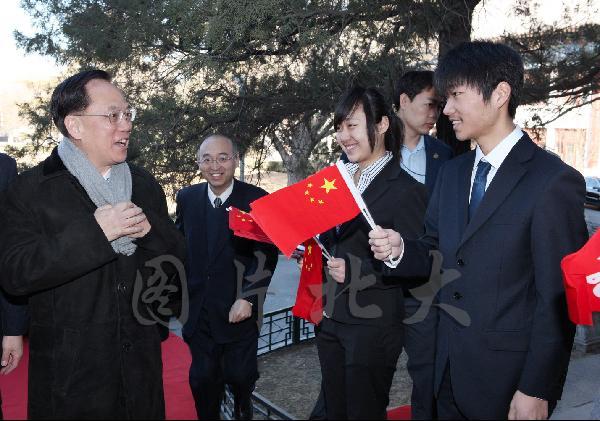
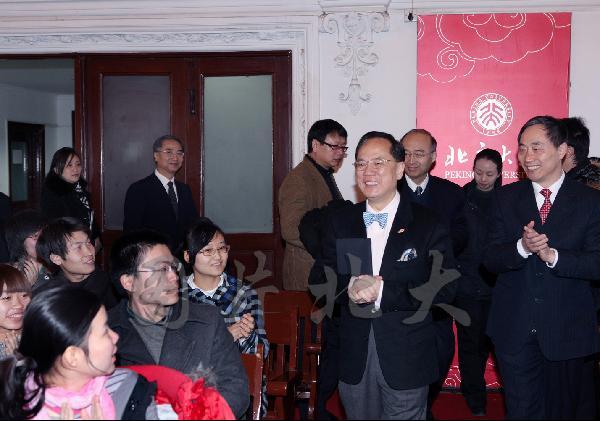
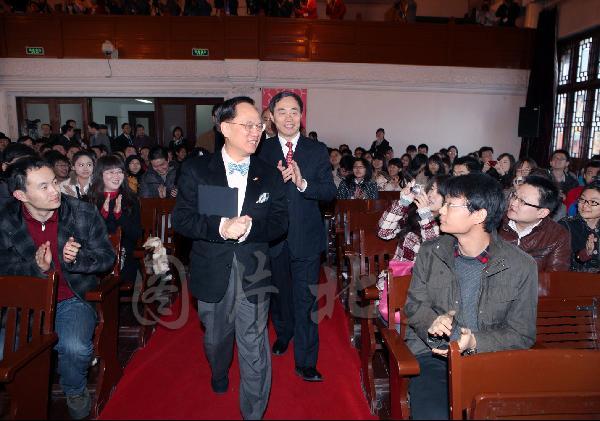
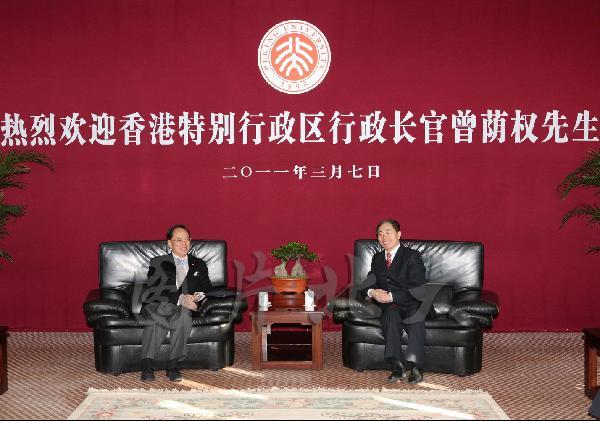
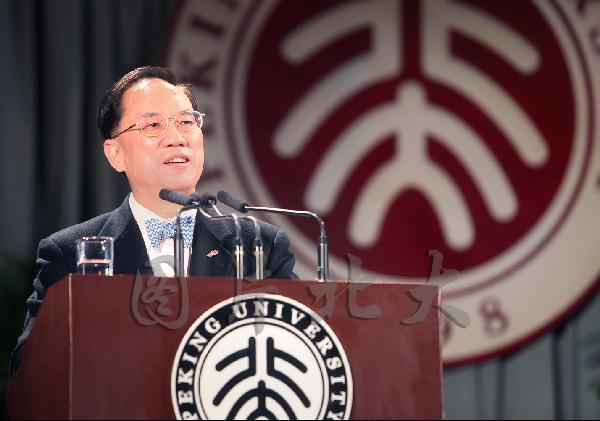
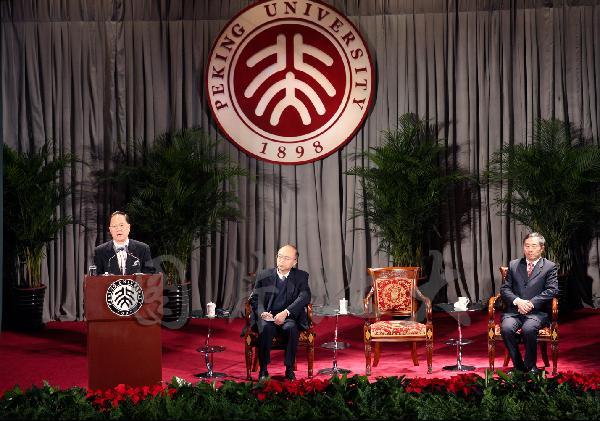
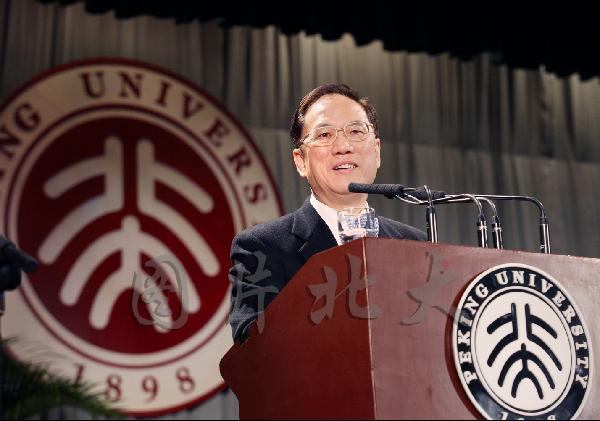
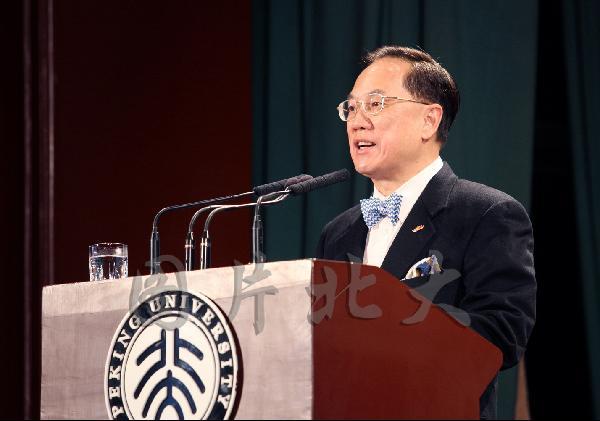
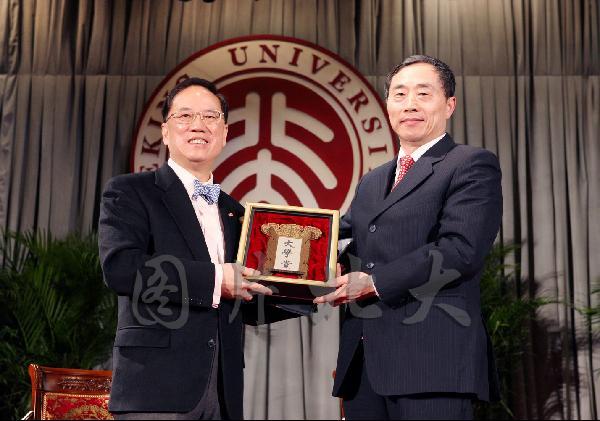
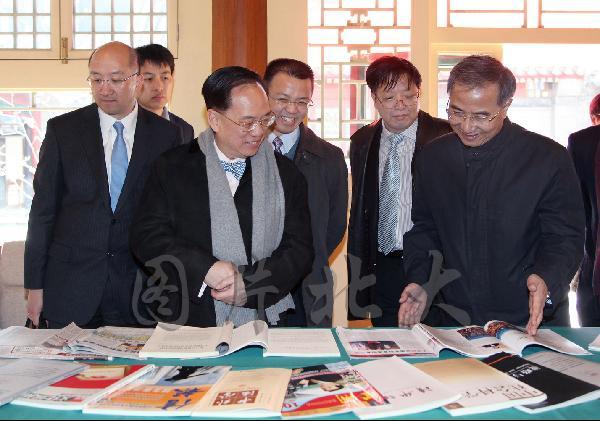
Tsang has a nickname of bowtie Tsang for his preference of wearing a bowtie instead of a necktie. When Tsang appeared with his bowtie of blue-white stripe at PKU Administrative Building, he smiled and nodded to the audience and applause.
"It is an honor for me to have an opportunity to visit PKU, a university with a long history and beautiful scenery, said Tsang. The topic of his speech was "Hong Kong's role in China's modernization."
"Looking back at the past 150 years, both PKU and Hong Kong played important parts in our history which was full of frustrations and hopes, disgraces and revivals. With the struggle of generations after generations, we finally witness the revival of China. The most two crucial goals of modernization at present should be making our country strong and prosperous, and having every Chinese live with dignity," Tsang added.
Tsang said Hong Kong, as a highly mature international financial center in China, can play an important role in renminbi s going global process. The city can act as a testing ground for the internationalisation of RMB, providing a natural firewall to protect financial security on the mainland and supporting the country s financial strategy.
"Thanks to the significant increase of the trade settlement in RMB in Hong Kong, our RMB deposit keeps rising these years," said Tsang.
Tsang compared Hong Kong's role with Shanghai's, believing that they will complement each other in promoting the internationalization of RMB. "There is no direct competition between Shanghai and Hong Kong in the process because Shanghai is a leading financial center on the Mainland and is good at on-shore financial intermediation services, while Hong Kong is focusing on off-shore RMB business development," he added.
Another mainland city that Tsang noted was Beijing, whose subway line 4 signifies the collaboration on modern transportation management between Hong Kong and the Chinese capital. "To share such experiences is to participate in the development of mainland cities, to promote the urbanization of our country, and to improve people's livelihood," Tsang said.
"By precise urban planning and strict regulation, parks and greenbelts account 40% of the whole region. Residents enjoy fresh air and relieve pressure in nature," Tsang referred to Hong Kong's efforts despite its population density: 7 million plus people spreading over a territory of 1,104 km2," Tsang added.
The public transportation of Hong Kong is also a "model" of other cosmopolitans: "the transportation cost is only 5% of our GDP, while London is 7% and Houston is 14%.
Hong Kong is the place where Eastern and Western cultures meet. There it connects the East Asia and South-east Asia. "It will certainly play a crucial part in the country's going global strategy, said Tsang. "Therefore, I welcome PKU graduates to work in Hong Kong, and contribute our share to the modernization of China!
In the Q&A session, the first student asked: When I once came to Hong Kong, I couldn t find the way to the City University of Hong Kong, so I asked a local person in Putonghua. To my amazement, he couldn t understand me. And I have to explain it to him in English, and this time he got it and told me the answer. So do you think there is any need to promote Putonghua in Hong Kong?
"Definitely there is. Let me tell you a secret. I started to learn Putonghua when I was already over 40, and it was really hard for me. If I didn t speak well, please do not blame me. However, I can assure you that the kids and young people of Hong Kong can talk to you in fluent Putonghua, for we ve begun to teach it from the primary school. But it is a process, and thank you for reminding me of it, and we will keep up working on it, Tsang smiled, and the audience applauded.
A student from PKU College of Chemistry and Molecular Engineering asked Tsang how to handle the problem of demolition in the development of urbanization concerning Hong Kong s experiences. Tsang answered that the time was changing, and the former method of demolition was no longer applicable now. "Different families have different requests and it is very hard to reach a consensus. But as long as the government get to know the real conditions and consulted with the residents and resolved the problems of housing, employment, and education of children for them after their removal, the result could be a good one."
Given the status quo that RMB keeps appreciating and the purchase power of Hong Kong dollar is dropping, a PKU student from Hong Kong asked Tsang whether there was any possibility that the Hong Kong dollar would be pegged to RMB. Tsang replied that the pressure on exchange rate of Hong Kong dollar is really high, and the appreciation of RMB causes difficulty in exports for Hong Kong. As the trade volume of Hong Kong is three times larger than its GDP, such a situation does affect people s lives. But we will not change the monetary system in the near future in order to maintain the stability of trade and investment market, until the suitable time comes. The government will strive to keep price of commodities steady and pay more attention to people of low income and assist them by providing subsidies for them.
The last challenger from PKU School of International Studies asked Tsang how to balance the request of people and social order referring to Sunday's protest in Hong Kong.
Tsang responded: Hong Kong people enjoy complete freedom of speech. They can express their discontent by ways like demonstrations, and the police sometimes even assist them. However, Hong Kong is also a society with rule of law. If violence is involved or social order disrupted, the Hong Kong police, which have done their best to facilitate protests and demonstrationsis, are capable to control the situation. We respect everyone s freedom, but one should also respect others rights.
Tsang urged protestors to express their views in a "rational, lawful, and orderly manner." He proposed a "balanced attitude" to deal with this issue that concerns the young people in a following media session, according to a press release by his office.
"PKU students are not only interested in the nation's development, but also understand Hong Kong's situation well; their questions are insightful," Tsang noted in the session.
The chief executive visited PKU Center for Hong Kong and Macao Studies after the speech.
There are 224 Hong Kong students studying at PKU, according to Professor Min Weifang, chairman of PKU Council. "I believe that the visit of Chief Executive Tsang will be a milestone in the educational exchange between Hong Kong and the mainland," Professor Min said earlier in his welcoming speech.
Extended Reading:
Full text of CE Donald Tsang's speech at PKU (Information Services Department, HKSAR)
Reported by: Cao Yixing
Photographed by: Sun Linlin and Li Xianhua
Edited by: Jacques
Related News
Photos
More>>history
- Norway s Minister of Health Speaks at PKU
- Prof. Zhao BaiSheng Speaks at Harvard
- President of Lincoln Institute Gives Lecture at PKU: Evaluating Smart Growth
- Unveiling Ceremony of Confucius Institute of Moscow State University Held
- Chomsky Receives PKU Honorary Doctorate, His Lecture Depicts World Order
Traditions
- Strategy for Global Partnerships
- PKU President Zhou Qifeng Attends New York Alumni Association Annual Meeting
- U.S. Council of Foreign Relations President Richard Haass Speaks at PKU
- Lars Loekke Rasmussen: Prospects of Green Growth out of Economic Crisis
- UCLA-PKU Joint Research Institute (JRI) Holds First Annual Symposium





